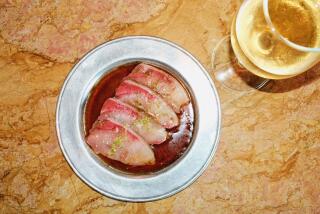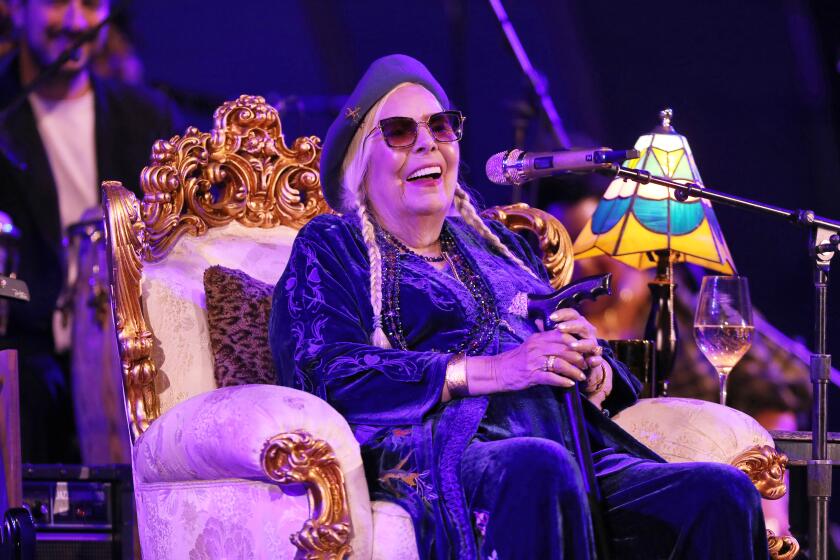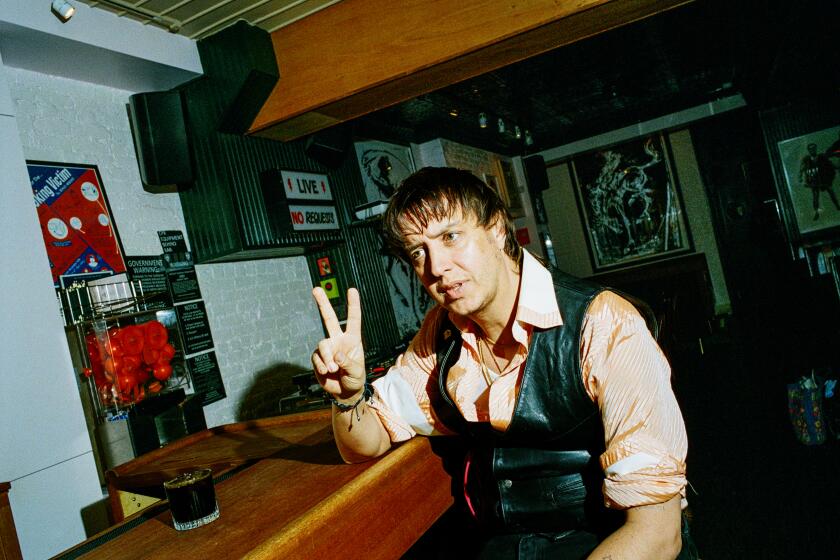Now That’s L.A.
“The future always looks good in the golden land, because no one remembers the past.”
--Joan Didion, “Some Dreamers of the Golden Dream”
*
In a metropolis known for tossing its history out with the trash, reinvention is a means of survival. Forget rearview mirrors, baby, this is Accelerator City. Blink, and you might miss the next big thing.
The most vibrant happenings in L.A. usually emerge from the underground, and the bohemian refuge of Silver Lake--the current cultural flash point--is no exception.
This diverse region--divided roughly from Hollywood by Vermont Avenue and mingling with such low-key areas as Echo Park, Los Feliz, Mount Washington and Atwater--is garnering big attention with a plethora of wildly original bands and an equally eclectic group of clubs.
The scene has already given the pop world two of the most acclaimed albums of the ‘90s, the folky hip-hop trip of Beck’s “Odelay” and the roots-flavored punk of the Geraldine Fibbers’ “Lost Somewhere Between the Earth and My Home,” which speaks of the confusion and conflicts of life in Los Angeles.
And there’s excitement building about more than a dozen up-and-coming groups, some of which have been signed by major labels--including Extra Fancy, Possum Dixon and Lifter--and others that have scouts sniffing around. The latter include Touchcandy, a coed glam- and punk-spirited quartet fronted by sexy London transplant David Willis, and Velouria, an excellent pop trio with a battery of infectious songs.
These and other colorful acts have honed their craft in lively Silver Lake clubs that range from Spaceland, a live music oasis located in a ‘70s discotheque, to the Garage, an underground dance and live music haven created from the ashes of a gay cowboy bar, to You’ve Got Bad Taste, a quirky retail store that doubles as a live music venue, and Dragstrip 66, a monthly drag club held at a former Mexican restaurant.
No small feat for an area so little it doesn’t even warrant its own ZIP Code.
“It’s a spot on the map, a drip in the universe,” says Lezle Stein, who was the main force behind “Silver Lake . . . What a Drag!,” a compilation album of area bands recently released on Neurotic Records. “A lot of cool bands and artists are living in Silver Lake and the spotlight’s on them.”
For decades now, this multiethnic region has been a haven for musicians, artists and filmmakers drawn to the area by its low rents and scenic landscape.
“People settle here because it’s cheap and the architecture is beautiful,” says Brian Grillo, the thirtysomething lead singer of Extra Fancy, who’s lived in the area for 15 years. “It appeals to people who appreciate a certain aesthetic. The buildings haven’t all been torn down. The apartments have views. It’s hilly and it has culture.”
One of the distinguishing characteristics of the Silver Lake club scene is its lack of conventional sexual boundaries. You won’t find anyone caring which nights are gay or straight on the club circuit. Much like the kindred venues of San Francisco, Silver Lake nightspots offer an effortless fusion of gay and straight audiences--along with music that seems to bend all gender lines.
Dragstrip 66, whose promoters Paul V. and Mr. Dan emphasize its “queerness,” has attracted a mixed crowd since its inception in 1993, and the Garage extended an open invitation to the gay community when it opened last August by offering weekly theme nights with a homoerotic bent.
One of the places where this carefree attitude is most visible is Spaceland, not because it’s the hub of the gay community--on the contrary, it probably offers the most traditionally indie alternative music on the circuit--but because stereotypes are broken down here most dramatically by virtue of the club’s wide popularity.
On any given night, you’ll find drag queens sharing the dance floor with arty chicks and indie rock boys, all of whom may have turned out to see a local punk act. And this isn’t a once-a-month or once-a-week occurrence, but a probability six nights a week.
Inspired in the early ‘90s by the eclectic Saturday night Highland Park club Fuzzyland, Silver Lake resident Mitchell Frank wanted to create a comfortable performance space to showcase local musicians.
“It was done in the spirit of, ‘If you come to my show, I’ll come to yours,’ ” says Frank, who opened his club at a venue called Dreams in March 1995. “Sure enough, it started to snowball into the ‘Silver Lake scene.’ ”
Frank, who was the keyboardist and percussionist in a now-defunct band called Gutbucket, already knew the area was rife with musicians. But by upping the ante to nightly live music, he believed, the industry was sure to come ‘round.
“Now, industry people not only are coming here to seek out music acts, they’re moving here,” says Frank, who co-owns Nickelbag Records with the Dust Brothers, the critically acclaimed production duo behind Beck’s “Odelay.” “They come up to me at the club and thank me for turning them on to the area.”
*
For anyone who hasn’t ventured to this neighborhood east of Vermont, the avenue that locals point to as the quasi-official border with Hollywood and all other things Westside, Silver Lake derives its moniker from a fenced body of water located in its northern tip.
Named after Herman Silver, the city water and power commissioner who in 1906 authorized the creation of the reservoir, Silver Lake remained pretty much a desert terrain until the ‘20s, when the first residents began planting greenery.
The region’s artistic history dates back to the early days of the silver screen, when it was used as a backdrop for such films as D.W. Griffith’s silent landmark “Intolerance” and Laurel & Hardy’s classic 1932 farce “The Music Box.” Judy Garland, Clark Gable, Gloria Swanson and Fatty Arbuckle are among the celebrities who once lived in Silver Lake. Such architects as Rudolf Schindler and Richard Neutra (who has a Silver Lake street named after him) took a fancy to the area, where many of their works remain.
After World War II, however, much of the old glamour and money were gone--joining the migration to Beverly Hills and Bel-Air. On the map that measures money and power in Los Angeles, Silver Lake got left behind.
By the late ‘70s, Silver Lake became known on a pop culture level as a refuge for society’s “misfits.”
“Silver Lake was gays and punks, the outcasts who didn’t fit in anywhere else,” says John Roecker, co-owner of You’ve Got Bad Taste and a resident here in the ‘70s and ‘80s. At the time, Roecker was a punk-rock kid himself who eventually moved to San Francisco in the late ‘80s.
“AIDS came and wiped everything out here. . . . I was shocked when I moved back into the area. There was nothing left but Laundromats and 99-Cent Stores.”
Because of its central location and punk spirit, You’ve Got Bad Taste functions as the nerve center of the Silver Lake scene. Lured by the cheap rents, Roecker and partner Exene Cervenkova opened the shop early last year and watched the neighborhood turn around.
Their store, which sells such ‘70s pop culture kitsch as REO Speedwagon tattoos and Johnny Rotten candles, is set in the heart of Silver Lake’s Sunset Boulevard stretch. Roecker, referred to by local musicians as the eyes and ears of the Silver Lake scene, keeps binoculars by the cash register so he can assess the boulevard happenings. Currently, there’s plenty to witness.
Six months ago, a vintage toy store and psychedelic shop, Out of Our Heads, opened up next door to Bad Taste. About the same time, the Soap Plant reopened nearby. The shop, famous for its variety of books, art and kitsch merchandise, was originally based in Silver Lake before moving to Melrose. In addition, across the street is Glaxa Studios, a refurbished independent theater, cafe and live music space. Such mainstays as Millie’s, a popular diner, Ozzie Dots, a vintage clothing store, and the indie record store Rockaway Records are also thriving. Night owls can always be found at Astro Family Restaurant, the neighborhood’s 24-hour coffee shop.
Most notably, the region has been blossoming with remembrances of punk’s past for some time. Brett Gurewitz, the ex-Bad Religion guitarist and owner of the successful punk indie label Epitaph, opted to base the business in Silver Lake. Paul Rossi, a former front man of Wasted Youth, co-owns the year-old Garage with Rico Martinez, who created the club out of a bar called the Bunkhouse. And Roecker’s partner Cervenkova is a singer and poet who was a founding member of X.
*
On a recent Saturday afternoon at Bad Taste, underground locals Bobsled offer an inspired show before Tribe 8, a hard-core, self-proclaimed “dyke” band from San Francisco, takes over, performing a sweaty, hot and topless set to a multiethnic audience that includes shaved-head lesbians and punk-rock boys.
Vintage fliers on the walls announce distant gigs by L.A.’s first generation of punks--Black Flag, the Germs, the Weirdos, the Circle Jerks, the Bags. A haunting photograph of a Mohawk-topped Darby Crash, the lead singer of the Germs who died of an overdose in 1980, hangs above the performance area.
It’s uncanny how much this scene resembles the first generation, not so much in its music style as in its potent energy and attitude.
“There’s no trust-fund babies around here,” Roecker says. “These people are the real McCoy. That’s why there’s a little bit more integrity to the music. These bands aren’t willing to compromise--I don’t even think they know how to compromise.”
*
Spaceland owner Mitchell Frank still marvels at how clearly he saw the future of Silver Lake back in the days when his Spaceland club was just a place locals and local bands would frequent.
“I would go see a great Silver Lake band at Al’s Bar [downtown] and notice no other club owner was booking them around town,” says the film student-turned-promoter. “So I figured maybe I could fill a need here.”
The bands appreciated the offer.
“Usually the places that were doing underground music were kind of raunchy and smelly, with dirty bathrooms,” says Stew, the front man for the Negro Problem, a multiethnic, coed psychedelic rock band with smart political overtones. “Suddenly you had this [club] with a high kitsch factor--disco lights and air conditioning--and it appealed to everyone’s post-modern sensibility. It was totally ‘90s that this music could go ‘uptown’ without leaving the neighborhood.”
Martinez and Rossi had a similar game plan. The owners of the more intimate Garage, located in outer Silver Lake near the corner of Santa Monica Boulevard and Virgil Avenue, have also increased the profile of the local music scene. Its Sunday afternoon punk-rock club, Sucker, has become a favorite place to perform in the area.
“This sounds really hippie and cheesy,” says Martinez, an underground filmmaker, “but in the abstract, I was hoping to create a place where you could feel comfortable, that wasn’t pretentious but was still interesting.”
This underground attitude is one of Silver Lake’s distinguishing elements.
“People don’t come here to be rock stars,” says Paul V., who manages Porno for Pyros and Extra Fancy. “They come here to do what they do, and if they get noticed, cool.”
It’s this “anti-scene” spirit that drew people to the neighborhood in the first place. A daytime stroll along Sunset, the hub of the neighborhood, reveals a poor man’s vision of beauty: Men and women hawk watermelons neatly stacked in the backs of battered trucks, and liquor stores sell 99-cent key chains etched with the face of Jesus. Weather-beaten pink and blue turrets give the Spanish style stucco homes that colorfully dot the hillsides a seen-better-days dignity.
The images--filled out by murals recalling the annual Sunset Junction street fair, which takes place on Aug. 24 and 25 this year and features such bands as Extra Fancy, Touchcandy and Velouria--are complemented by the soothing Mexican music that seems to crawl out of every crevice.
“People here tend to care about their little streets, their gardens, their neighbors,” says Touchcandy singer and guitarist Willis. “It’s the first time in my life I’ve been a part of a community.”
As evening falls, however, the area’s niceness can begin to evaporate, replaced by a somewhat sinister quality. It’s not uncommon to hear gunshots, a reminder that the streets are shared with a populace that also has a sense of community pride--the gangs.
“There is an element of danger here,” says Extra Fancy’s Grillo, who was constantly admonished by a friend not to walk alone through a tunnel near his home. “I kept telling him, ‘I like walking through that tunnel,’ and sure enough, one day I was held up at knifepoint. But I got a great song out of it.”
It’s these contradictions, the bitter and the sweet, that Carla Bozulich cherishes. The lead singer of the Geraldine Fibbers says she feels sad and scared by the current spotlight on Silver Lake.
“Leave little Silver Lake alone,” she says. “It bums me out because a few years ago, nobody gave a [expletive] about this area. It was Mexicans and artists and they do this to artists all the time. . . . The rents are going up and pretty soon it’s gonna be the Third Street Promenade.”
“The Silver Lake scene is so home-grown,” counters Frank Rodriguez, the booker of Sucker, which is hosted by the boisterous drag performer Miss Vaginal Creme Davis. “It would be hard to turn this into a commodity. There are so many West Hollywood places that are industry showcases, and the east side is so grungy, people are afraid their cars will get broken into and it always keeps certain folks away.”
In addition, the art spawned by this community isn’t particularly buzzword-friendly, a drawback for an industry that’s usually a beat behind--typically running after the next Hootie or Alanis rather than developing new artists. Perhaps not ironically, Extra Fancy, the closest this scene comes to having its own rock icon, was quietly dropped by Atlantic Records last month, only eight weeks after its debut album, “Sinnerman,” was released by the label.
Although it’s an exceptional live rock band, the consensus among observers is that Grillo’s openly gay lyrics and stance spooked the label, even though the company launched the group with a coinciding campaign promising to target gay consumers.
“Every quarter we evaluate our roster,” an Atlantic spokeswoman says. “It has nothing to do with the band personally.”
Still, some question the move.
Pointing at the fliers and pictures of punk’s first generation on Bad Taste’s walls, Roecker notes, “The commercial world wasn’t ready for them either, remember?
“People say to me, ‘God, it must’ve been great to see the Germs.’ Well, here’s your opportunity: You have a scene. Instead of spending $55 to go see the Sex Pistols, you can go see about 50 bands around here.”
Since what’s here today will most likely be gone tomorrow, and with the limelight currently focused on Silver Lake, there’s little doubt a new migration is already underway.
“We’re racing against time,” Roecker says. “It won’t be like this forever. So go see the bands, come out to the shows. Enjoy it while you can, ‘cause before you know it, it’ll be gone.”
(BEGIN TEXT OF INFOBOX / INFOGRAPHIC)
Destination: Silver Lake
DINERS
1. Astro Family Restaurant, 2300 Fletcher Drive
2. Millie’s, 3524 W. Sunset Blvd
SHOPS
3. Ozzie Dots, 4637 Hollywood Blvd.
4. Song Plant, 4633 Hollywood Blvd.
5. You’ve Got Bad Taste, 3816 Sunset Blvd.
6. Rockaway Records, 2395 Glendale Blvd.
RECORD LABELS
7. Epitaph, 2798 Sunset Blvd.
PERFORMANCE
8. Glaza Studios, 3707 W. Sunset Blvd.
CLUBS
9. The Garage, 4519 Santa Monica Blvd.
10. Spaceland (at Dreams), 1717 Silver Lake Blvd.
11. Dragstrip 66 (at Rudolpho’s), 2500 Riverside Drive
More to Read
The biggest entertainment stories
Get our big stories about Hollywood, film, television, music, arts, culture and more right in your inbox as soon as they publish.
You may occasionally receive promotional content from the Los Angeles Times.










